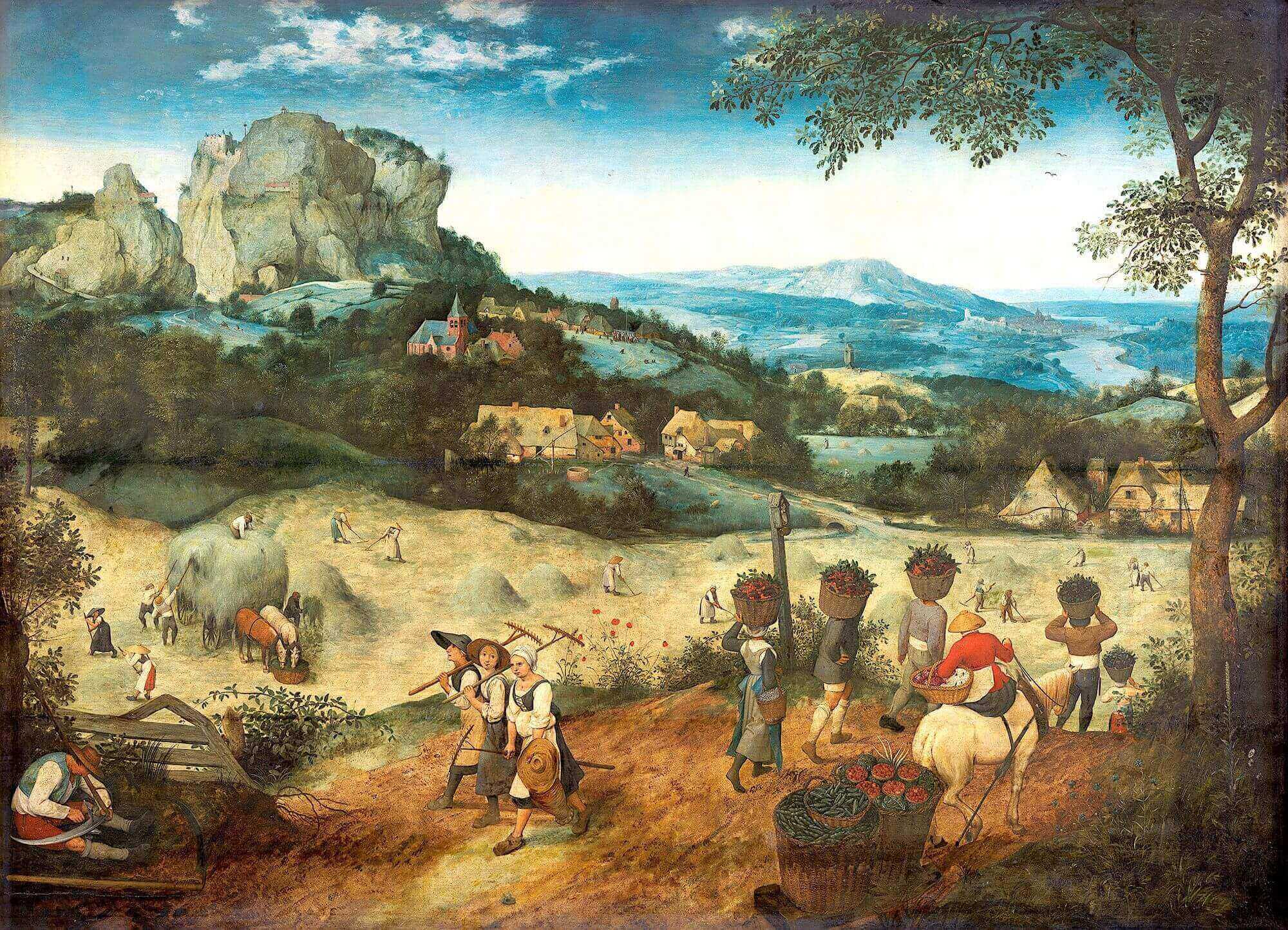In this article, we’re going to explore the idea that there is something inherently good about work, that work may in some sense be our salvation.
Probably all of us grumble about our work from time to time. But for all our grumbling, we often see work in itself as a good thing. We praise people for working hard, and we criticise them for slacking off. We tell each other how hard we are working, and when we do, we feel the warm glow of virtue. This is sometimes talked about as a work ethic, the idea that there is something inherently virtuous or improving about work.
This is how the 19th-century Scottish philosopher and historian Thomas Carlyle (1795-1881) puts it:
A man perfects himself by working . . . Consider how, even in the meanest sorts of Labour, the whole soul of man is composed into a kind of real harmony, the instant he sets himself to work! Doubt, Desire, Sorrow, Remorse, Indignation, Despair itself, all these like helldogs lie beleaguering the soul of the poor day-worker, as of every man; but he bends himself with free valour against his task, and all these are stilled, all these shrink murmuring far off into their caves. The man is now a man. The blessed glow of Labour in him, is it not purifying fire, wherein all poison is burnt up? [1]
But is Carlyle right? Is work really the only thing that can keep the helldogs of doubt, desire, sorrow, remorse, indignation, and despair at bay? And if work is inherently good, how is it good? Where does the goodness of work lie?
Work! What is it good for?
One answer to this question is to say that work is good because it is done for the sake of good things. The goodness lies not in the work itself, but in the ends to which the work is put. So, for example, working in your garden to grow vegetables is a good thing because, if all goes well, you end up with tasty vegetables. And who doesn’t like tasty vegetables? Similarly, working in a waged job is good because you need to feed yourself and those close to you.
In the first article in this series, we looked at external and internal goods. When we say work is good for the sake of something other than work, what we mean is that work is a means to gaining external goods: food, shelter and so on. In the second piece, we saw how labour is, to some degree, a necessity: we need to sustain ourselves and support our basic needs. And supporting our basic needs is no doubt a good thing.
But is work inherently good? In other words, are there internal goods associated with work, simply because it is work? For Carlyle, there certainly are. But not all philosophers agree. Take Aristotle, for example. For Aristotle, the point of work is that it gives us the leisure to contemplate. Work is good only insofar as it can open up spaces where we are free from work. There is no purifying fire of labour in Aristotle. In the Politics (1333a, 30-35), he writes that,
the whole of life too is divided into work and leisure, war and peace, and of actions some are necessary or useful, others noble. And the same choice must be made among these as among the parts of the soul and their actions. War must be chosen for the sake of peace, work for the sake of leisure, necessary and useful things for the sake of noble ones. [2]
Work is good for one thing, and for one thing alone: for providing us with leisure. And only a fool would choose to work for its own sake. For Aristotle, leisure is more choiceworthy than work, because only when we are committed to leisure can we truly flourish.
Leisured activity is itself held to involve pleasure, happiness, and living blessedly. This is not available to those who are working, however, but only to those who are engaged in leisured activity. [3]
The goodness of work
But it is not obvious that this is true. And although Carlyle may go too far in celebration of work, any account of work that ignores—as Aristotle’s account does—the possibility of internal goods fails to do justice to the richness of our experience of work.
Imagine you are a craftsperson in Ancient Greece, and you are making a table. It is hard work. But if you are a good carpenter, as you work—cutting and carving and sanding, delighting in the feel of the wood—you will find yourself experiencing those things that Aristotle aligns with leisure: happiness, pleasure and even a kind of blessedness. As any craftsperson knows, crafting new things can be deeply, humanly satisfying.
Manual labour, too, can be satisfying or enjoyable, even if it is difficult. Several years ago, I was on a Buddhist retreat. One day, during a work period, I was tasked with clearing the sludge from a large pond in the retreat centre grounds. It was hard work, and at first, I found it unpleasant. I was up to my knees in mud, hauling slime from the pond with a rake. I sifted the slime for newts (the newts needed saving and putting back in the water), and then, once the slime was newt-free, took it in a wheelbarrow to be dumped at the bottom of the garden.

For the first half-hour, I was miserable. But as I got into it and found my rhythm, I started to relish the ache of my muscles, the feel of the sun on my back, the delight of communing with newts, the creak of the wheelbarrow. Eventually, I realised to my surprise that I was having fun.
The moral perils of idleness
So work can involve both external goods (putting food on the table) and internal goods (it can be inherently satisfying). But Carlyle is saying more than this. He is not just saying that work involves some internal goods. He is saying that work, insofar as it is work, is in itself a path to virtue. It is a road that leads to purification and even to salvation. The devil, after all, makes work for idle hands; and if we don’t work, what will become of us? We will become listless, or—even worse—troublesome.

Like many ideas, this idea of work as a path of virtue has deep historical roots. Christian thought has a long history of valuing work and cautioning against idleness. In the Bible, God works to create the world for six days and rests on the seventh. And for many Christian thinkers, this was taken as a model for how we ourselves should lead our lives.
Here, however, it is important to make a distinction between rest and idleness. Rest is inactivity for the sake of work. It is inactivity so that we can return to work with renewed vigour. But idleness is inactivity instead of work. There is a scriptural sanction for rest. But in the Christian tradition, idleness is often seen as being much more morally problematic.
One good example is Benedict of Nursia (480-547), whose Rule of St. Benedict was one of the foundational texts for the Christian monastic tradition. In his Rule, Benedict repeatedly talks about work as a sacred duty, and idleness as a dereliction of this duty. In chapter 48, Benedict writes,
Idleness is the enemy of the soul. Therefore, the brothers should have specified periods for manual labour as well as for prayerful reading. [4]
For Benedict, work is good for the soul. Here, Benedict is elevating internal goods (the inner moral improvement the comes from work) over external goods (the usefulness of work in terms of external concerns). Benedict notes that even those who are afflicted by sickness or old age should have tasks assigned to them, so that they can avoid the spiritual peril of idleness.
Brothers who are sick or weak should be given a type of work or craft that will keep them busy without overwhelming them or driving them away. [5]
We’re all monks now: vocation universalised
In his 1905 essay Die protestantische Ethik und der Geist des Kapitalismus (later translated into English as The Protestant Ethic and the Spirit of Capitalism), the sociologist Max Weber writes that Benedict’s rule was an attempt to comprehensively refashion human life according to rational principles. The life of Benedict’s monks was governed by a regulated pattern of work, prayer, and activity that could free them from their own irrational whims and desires.
The aim was thus to train the monk—objectively speaking—to be a worker in the service of the kingdom of God, and so also—subjectively speaking—to ensure the salvation of his soul. [6]
As far as Benedict was concerned, this idea of work as salvation was restricted to those who had a religious vocation. But in his essay, Weber explores how in later European history, this notion of vocation (in the original German, Weber uses the term Beruf, which can mean both “occupation” and “calling”) became universalised.
Today many of us may think that we have—or should have—a sense of vocation. We say to ourselves it is our vocation to be a writer, an artist, a nurse, a digital asset manager or whatever. This idea of vocation as something we all should have, Weber argues, goes back to the German theologian Martin Luther (1483-1546).
Luther’s innovation was to see vocation as something that was not the sole concern of monks, but instead of anybody at all. For the theologian, “vocation is the work of faith; vocation is worship in the realm of the world.” [7]

This universalised notion of vocation undermined the justification for monasticism. If we all have a vocation and if all work is a path to salvation, then why be a monk?
But in a more subtle sense, this universalised vocation turned us all into monastics of a sort. If all work is about vocation, if all work is about a calling to participate in God’s work, then, like Benedict’s monks, we are all obliged to spend our days in labour, to rest only so that we can work more and work better, and to shun idleness as an affliction of the soul.
Of monks and CEOs
As this Protestant work ethic developed, Weber claims, the accumulation of wealth came to itself be seen as a sign of virtuous diligence: but only, paradoxically, if the person who was accumulating this wealth did not enjoy it for its own sake. Weber writes,
Wealth is thus bad ethically only in so far as it is a temptation to idleness and sinful enjoyment of life, and its acquisition is bad only when it is with the purpose of later living merrily and without care. But as a performance of duty in a calling it is not only morally permissible, but actually enjoined. [8]
It is a strange idea, but it is an idea that is still with us. One particular manifestation of this idea can be found in that curious contemporary hero, celebrated so frequently in the business press: the billionaire CEO who—while accumulating great wealth—lives a simple, monastic life, following a routine of work, restricted diet, exercise, and meditation.
It is a curious vision of the good life. And it is almost, but not quite, a lifestyle of which Benedict himself would have approved. But there’s nothing inevitable about this idea of work as a kind of salvation, this sense of monastic duty that hangs over us as we work, or this bizarre notion that the accumulation of wealth has a moral dimension—but only if we do not profit overly from the wealth we accumulate.
So in next week’s article, we’ll ask whether work is really the path to virtue after all.
Questions
- Think about a time when you have engaged in hard, physical work. Was it enjoyable? Did it make you a better person? If so, how?
- Is there something good about all work, beyond the more obvious external goods (the results of work, income etc.) and internal goods (enjoyment, pleasure etc.) that work might involve?
- Is idleness morally dangerous? If so, why?
- Do you see yourself as having a vocation? If you do, what is your vocation? And how do you pursue it? How is a vocation different from simply doing something you are good at, or something you are interested in?
Notes
- Thomas Carlyle, Past and Present (London: Chapman and Hall, 1843), 173.
- C.D.C. Reeve, translator, Aristotle: Politics (Hackett 1998), p. 216.
- Ibid. (1338a 1-5):
- Timothy Fry, translator, The Rule of St. Benedict in English (The Liturgical Press 1983), p. 69.
- Ibid. p 70
- Max Weber (translated Talcott Parsons), The Protestant Ethic and the Spirit of Capitalism (Routledge 1992), p. 72.
- Quoted in Carter Lindberg, “Luther’s struggle with social-ethical issues”, in The Cambridge Companion to Martin Luther (Cambridge University Press 2003) pp. 165-178.
- The Protestant Ethic, p. 108.
More further reading
Books and articles
David Graeber’s Bullshit Jobs (Simon and Schuster 2018) is well worth reading for the way it picks apart our approach to work. We’ll be talking about this book in the next piece.
Online resources
Read this piece in the New York Times about the goodness, or badness, of work.
Here’s an article on the roots of the Protestant work ethic in the theology of Martin Luther.
And there’s another piece from the New York on how Martin Luther changed the world.
Image: Pieter Brueghel the Elder, The Hay Harvest. 1565. Public domain via Wikimedia Commons.



